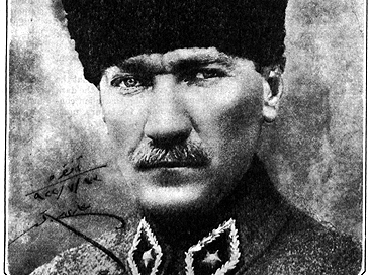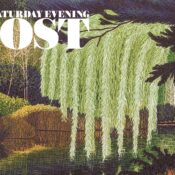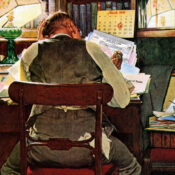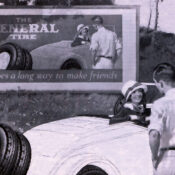The Ghazi’s Residence
As we neared Kemal’s abode we began to encounter troops, who increased in numbers the farther we went. These soldiers represented one of the many precautions taken to safeguard Kemal’s life because he is in hourly danger of assassination by some enraged Greek or Armenian. Several attempts have already been made to shoot him, and in one instance his companion, a Turkish officer, was seriously wounded by the would-be assassin.
Two previous Turkish leaders, both of them tools of the Germans, the notorious Talaat Pasha and his mate in crime, the no less odious Enver Pasha, met violent deaths after the World War. But Kemal represents a different kind of stewardship.
Soon an attractive white stone house, faced with red, surmounting a verdant hill, and surrounded by a neat garden and almond orchard, came into view. At the right was a smaller stone cottage. Reschad Bey, who had been there before, informed me that this was Kemal’s establishment, which was the gift of the Turkish nation. I might have otherwise known it because the guard of sentries became thicker. When we reached the entrance we were stopped by a sergeant and asked to tell our business. Reschad Bey told the man that I had an appointment with the Ghazi and he took my card inside.
In a few moments he returned and escorted us into the little stone cottage, which Kemal uses as a reception room. Here I found the Ghazi’s father-in-law, Mouammer Ouchakay Bey, who is the richest merchant of Smyrna and who incidentally was the first Turkish member of the New York and New Orleans cotton exchanges. He had visited America frequently and therefore spoke English. He told me that Kemal was engaged in a cabinet meeting and would see me shortly.
Meanwhile I looked about the room, which was filled with souvenirs of Kemal’s fame and place in the Turkish heart. On one wall was the inevitable Koran inscription. This one read, “God has taught the Koran.” There were various memorials beautifully inscribed on vellum, expressing the homage of Turkish cities, and also magnificent jeweled gift swords. But what impressed me most was the life-size portrait of a sweet-faced old Turkish woman that had the most conspicuous place in the chamber. I knew without being told that this was Kemal’s mother. It was on her grave that he swore vengeance against the Greeks, who had once driven her out of her home. I had heard this tale many times, and Mouammer Bey and others confirmed it. Happily for the mother, she lived long enough to see her son the well-beloved of the Turkish people.
Kemal’s Steely Eye
I had just launched into a discussion of the Turkish economic future with Mouammer Bey when Kemal’s aid, a well-groomed young lieutenant in khaki, entered and said that the Ghazi was ready to see me. With him I crossed a small courtyard, went down a narrow passage, and found myself in the drawing-room of the main residence. It was furnished in the most approved European style. In one corner was a grand piano; opposite was a row of well-filled bookcases, many of the volumes French, while on the walls hung more gift swords. In the adjoining room I could see a group of men sitting around a large round table amid a buzz of rapid talk. It was the Turkish cabinet in session, and they were discussing the latest telegrams from Lausanne, where Ismet Pasha, minister of foreign affairs, and the only absent member, had, only the day before, delivered the Turkish ultimatum on the Chester Concession and the Turkish foreign debt. Economic war, or worse, hung in the balance.
As I advanced, Rauf Bey came out and escorted me into the room where the cabinet sat. There was a quick group introduction. I had eyes, however, for only one person. It was the tall figure that rose from its place at the head of the table and came towards me with hand outstretched. I had seen endless pictures of Kemal and I was therefore familiar with his appearance. He is the type to dominate men or assemblages, first by reason of his imposing stature, for he is nearly six feet tall, with a superb chest, shoulders and military bearing; then by the almost uncanny power of his eyes, which are the most remarkable I have ever seen in a man, and I have talked with the late J. P. Morgan, Kitchener and Foch. Kemal’s eyes are steely blue, cold, stony, and as penetrating as they are implacable. He has a trick of narrowing them when he meets a stranger. At first glance he looks German, for he is that rare Turkish human exhibit, a blond.
His yellow hair was brushed back straight from the forehead. The lack of coloring in his broad face and the high cheek bones refute the Teutonic impression. He really looks like a pallid Slav. Few people have ever seen Kemal smile. In the two hours and a half that I spent with him his features went through the semblance of relaxation only once. He is like a man with an iron mask, and that mask is his natural face.
I expected to find him in uniform. Instead he was smartly turned out in a black morning coat with gray striped trousers and patent-leather shoes. He wore a wing collar and a blue-and-yellow four-in-hand tie. He looked as if he was about to pay his respects to a fashionable hostess at a reception in Park Lane, London, or Fifth Avenue, New York. Kemal, I might add, has always been a stickler for dress. He introduced the calpac, the high astrakhan cap which has succeeded the long-familiar red fez as the proper Turkish headgear, and which is a badge of Nationalism.
Rauf Bey introduced me to Kemal in the cabinet room. After we had exchanged the customary salutations in French he said, ” Perhaps we had better go into the next room for our talk and leave the cabinet to its deliberations.” With this he led the way into the adjacent salon. With Rauf Bey at my right and Kemal on the left, we sat down at a small table. A butler, no less well groomed than his master, brought the inevitable thick Turkish coffee and cigarettes. The interview began.
Although the Ghazi knows both French and German, he prefers to talk Turkish through an interpreter. After I had expressed, again in my alleged French, the great pleasure I had in meeting him, Rauf Bey interposed the statement that perhaps it might be best for the great man to carry on in his own language. This was agreed upon, and henceforth the premier acted as intermediary.
Kemal had somehow heard of the difficulties and delays which had attended my trip to Angora. He at once apologized, saying that in the handicaps that beset administration in such a place as Angora such things were liable to happen. Then he added, “I am very glad you came. We want Americans in Turkey, for they can best understand our aspirations.”
Then, straight from the shoulder, as it were, and in the concise, clear-cut way he has of expressing himself —it is almost like an officer giving a command—he asked, ” What do you want me to tell you?”
“First of all,” I replied, “can you give me some kind of message to the American people?”
There was method in this query because I knew that he felt friendly toward Americans and that it would immediately loosen the flow of speech. It is a maneuver in interviewing taciturn people that seldom fails to launch the talk waves.
Admiration for Washington
Without the slightest hesitation—and I might add that throughout the entire conversation he never faltered for a reply—he said:
“With great pleasure. The ideal of the United States is our ideal. Our National Pact, promulgated by the Grand National Assembly in January, 1920, is precisely like your Declaration of Independence. It only demands freedom of our Turkish land from the invader and control of our own destiny. Independence, that is all. It is the charter and covenant of our people, and this charter we propose to defend at any cost.
“Turkey and America are both democracies. In fact the Turkish Government at present is the most democratic in the world. It is based on the absolute sovereignty of the people, and the Grand National Assembly, its representative body, is the judicial, legislative and executive power. Between Turkey and America as sister democracies there should be the closest relations.
“In the field of economic relations, Turkey and the United States can work together to the greatest mutual advantage. Our rich and varied national resources should prove attractive to American capital. We welcome American assistance in our development because, unlike the capital of any other country, American money is free from the political intrigue that animates the dealings of European nations with us. In other words, American capital does not raise the flag as soon as it is invested.
“We have already given one concrete evidence of our faith and confidence in America by granting the Chester Concession. It is really a tribute to the American people.
“All my life I have had inspiration in the lives and deeds of Washington and Lincoln. Between the original Thirteen States and the new Turkey is a curious kinship. Your early Americans threw off the British yoke. Turkey has thrown off the old yoke of empire with all the graft and corruption that it carried, and what was worse, the selfish meddling of other nations. America struggled through to independence and prosperity. We are now in the midst of travail which is witnessing the birth of a nation. With American help we will achieve our aim.”
Then leaning forward, and with the only animation he displayed throughout the whole interview, he asked:
“Do you know why Washington and Lincoln have always appealed to me? I will tell you why. They worked solely for the glory and emancipation of the United States, while most other Presidents seemed to have worked for their own deification. The highest form of public service is unselfish effort.”
“What is your ideal of government?” I now asked. ” In other words, do you still believe in Pan-Islam and in the Pan-Turanianism idea?”
“I will tell you briefly,” was the response. ” Pan-Islam represented a federation based on the community of religion. Pan-Turanianism embodied the same kind of community of effort and ambition, based on race. Both were wrong. The idea of Pan-Islam really died centuries ago at the gates of Vienna, at the farthest north of the Turkish advance in Europe. Pan-Turanianism perished on the plains of the East.
“Both of these movements were wrong because they were based on the idea of conquest, which means force and imperialism. For many years imperialism dominated Europe. But imperialism is doomed. You find the answer in the wreck of Germany, Austria, Russia, and in the Turkey that was. Democracy is the hope of the human race.
Become a Saturday Evening Post member and enjoy unlimited access. Subscribe now




Comments
Very clever and very peaceful . Great leader.
History without bias is probably best perceived through articles written at its time for events and personalities which (who) are to be evaluated after passing the test of time, but are tarnished by opponents contemporaneously on purpose because they still continue to effect the present by their lasting resonances. Having learnt him very well to easily admire such a high caliber leader encompassing all universal values at large,I believe Kemal Pasha (our Ataturk) will contine to shine ever more, to become eventually a star above most founding fathers for all humanity.
It was great to read from a amazing journalist who got face to face with the great leader I admire.
Thank you Saturday Evening Post for publishing this article, and giving us another opportunity to learn Ataturk from his own words.
ATATÜRK YÜZYILIN LİDERİDİR. ÖNGÜRELERİ BİR BİR ÇIKIYOR. AYRICA BU RÖPORTAJI GERÇEKLEDİĞİNİZ İÇİN GAZETENİZE ŞÜKRANLARIMI İLETİYORUM…
I really appreciate your help, also publishing online this article is great! Hope many people can reach it easily and read, and understand one more time we had best leader in Turkish history and we need to keep all that improvement in hour life and history.
Thank you one more time for publishing this great article, and many many great years to the Post…
The greatest leader on earth. Thanks for everything Ataturk.
I would like to convey my gratitude to The Post. I have to express my appreciation that among other qualifications, The Saturday Evening Post has the vast experience and capability to enlighten the history.After 89 years posting this interview on your website is great service to acquaint the people on history.
I wish many successful 300 years to Saturday Evenin Post.